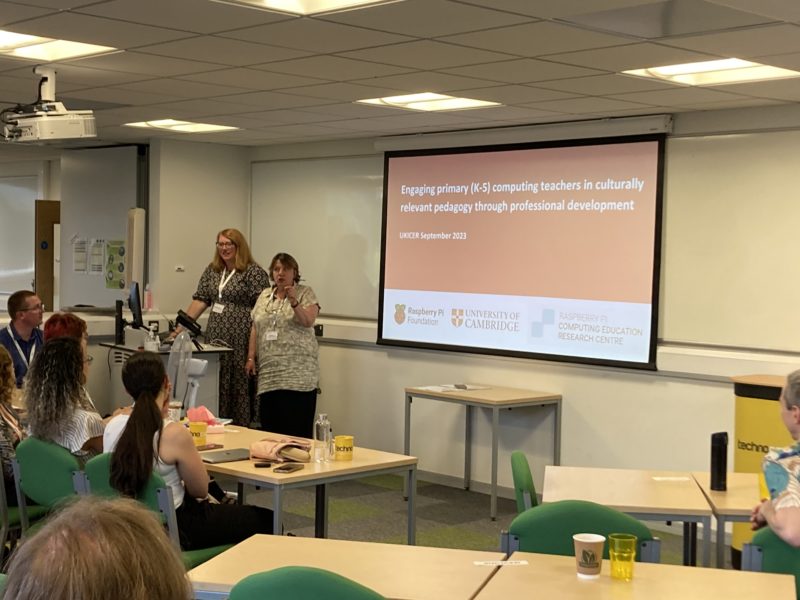In the extreme heat of early September, we were pleased to be able to attend the UKICER (UK and Ireland Computing Education Research) conference in Swansea. UKICER is a relatively small conference which spans computing education research in higher education as well as K-12. Most, but not all, attendees are from the UK and Ireland. It’s a great annual opportunity for like-minded researchers to get together and is always a very friendly community event, as well as an opportunity to hear about research in the area.
Doctoral workshop
The conference began with a half-day doctoral workshop attended by our PhD students, Laurie and Salomey, and led by Quintin Cutts and Neil Brown. This provided a useful opportunity for those early on in their PhD studies to present their work and receive feedback. Each doctoral student subsequently gave a lightning talk about their work to the whole conference.

Our papers
We presented two papers at UKICER:
Gale, L., & Sentance, S. (2023). Investigating the Attitudes and Emotions of K-12 Students Towards Debugging. In Proceedings of the 2023 Conference on United Kingdom & Ireland Computing Education Research (UKICER ’23). Association for Computing Machinery, New York, NY, USA, Article 7, 1–7. https://doi.org/10.1145/3610969.3611120.
This paper describes the first exploratory study undertaken by Laurie as part of his PhD, which focuses on the debugging behaviour and attitudes of lower secondary students. Laurie conducted some research in two secondary schools in which students aged 12-14 tried to debug a number of Python programs and then answered a survey about their emotions and attitudes. Research has shown that beginning programmers may feel helpless or frustrated when encountering errors in programs, and we can surmise that this emotional response may have an impact on their longer-term engagement with programming. This was the first paper Laurie has presented at an academic conference, and his presentation generated many questions and comments from the audience. Laurie has also captured log data that shows incrementally the actual programming behaviour of the students. This will be written up in a subsequent paper.

Leonard, H. C., Childs, K., Waite, J., Whyte, R., & Sentance, S. (2023). Engaging primary (K-5) computing teachers in culturally relevant pedagogy through professional development. In Proceedings of the 2023 Conference on United Kingdom & Ireland Computing Education Research (UKICER ’23). Association for Computing Machinery, New York, NY, USA, Article 6, 1–7. https://doi.org/10.1145/3610969.3611118.
Our second paper was presented by Katharine Childs and Jane Waite and is the first paper reporting on a study designed to support primary teachers incorporating culturally relevant pedagogy into their computing teaching. The paper focused on a teacher professional development (PD) workshop for primary teachers and reports on how attendance affected teachers’ confidence, attitudes, and perceptions of culturally relevant pedagogy for computing education.

Keynote presentations
The keynote talks were given by Marie Devlin of the University of Newcastle and Tom Crick of Swansea University. Marie talked about her long history of implementing interventions in her computing teaching in higher education and synthesised the learning in a way that gave us relevant take-aways. Tom focused on the development of the new school curriculum in Wales. Computer science in Wales is now part of a new interdisciplinary Science and Technology subject area, alongside the repositioning of digital competence as a statutory cross-curricular skill.
Paper presentations
Papers were clustered into themes including tools for CS education, early education and developing students in higher education. An interesting paper called Quick Fixes for Novice Programmers by Neil Brown et al from King’s College London investigated the extent to which programmers using BlueJ used the quick fix functionality – it seems that users don’t utilise it very often, but when they do it makes them more productive. Another well-received paper by Joyce Mahon and colleagues looked at the extent to which Large Language Models (LLMs) were able to perform when giving answers to school examinations in computer science – comparing the A-Level in England with the Higher Leaving Certificate in Ireland. At the school level, two other papers looked in depth at the way that abstraction is conceived and taught in primary education in Israel.
All papers can be accessed from the ACM Digital Library. Some papers are open-access, but if they are not, we recommend contacting the author who may have a pre-print version that they can share with you.
The UK and Ireland ACM SIGSCE chapters
UKICER is a conference that combines two special interest groups (SIGS) in computer science education – the UK ACM SIGCSE and the Ireland ACM SIGCSE. If you are a researcher in those countries, do join these friendly communities. There is also a journal club for the UK ACM SIGCSE that meets once a month.
Next year, UKICER will be in Manchester on 5-6 September. If you are interested in computing education practice, the CEP conference will be held in Durham on 5 January.
Thank you to the organisers!
We are grateful to Faron Moller and his team at Swansea University for organising such a great conference to bring the community together. We look forward to joining the community again next year!